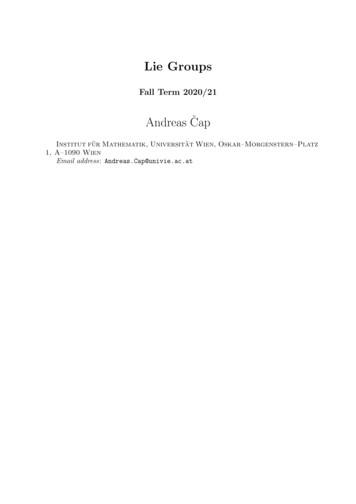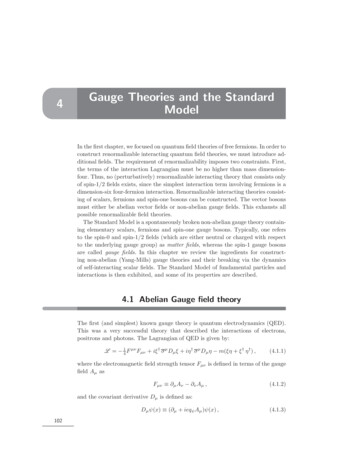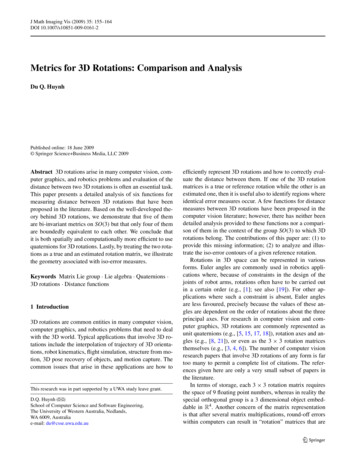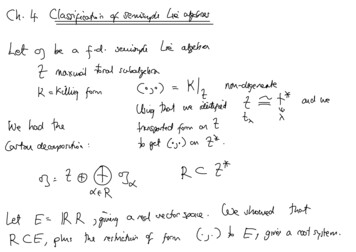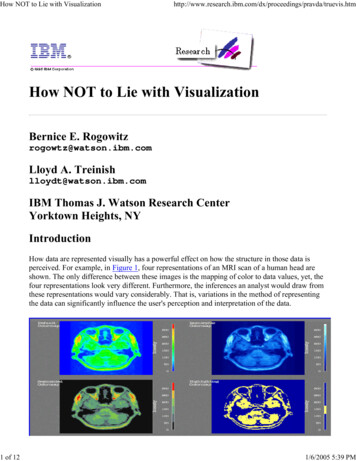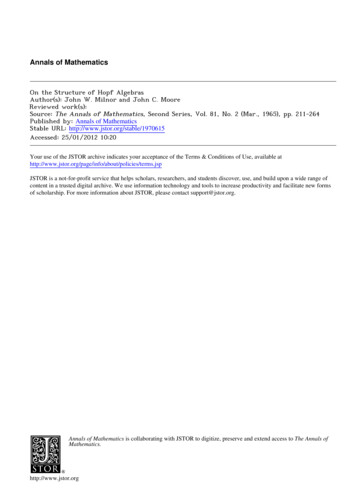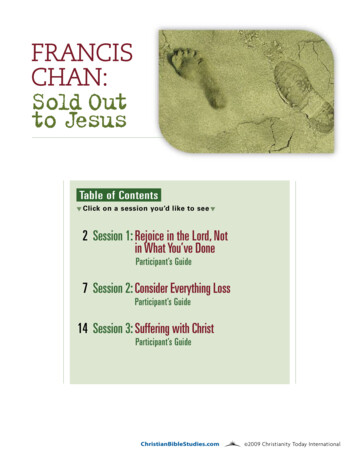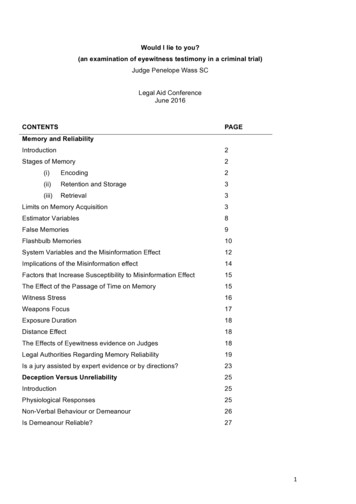
Transcription
Would I lie to you?(an examination of eyewitness testimony in a criminal trial)Judge Penelope Wass SCLegal Aid ConferenceJune 2016CONTENTSPAGEMemory and ReliabilityIntroduction2Stages of Memory2(i)Encoding2(ii)Retention and Storage3(iii)Retrieval3Limits on Memory Acquisition3Estimator Variables8False Memories9Flashbulb Memories10System Variables and the Misinformation Effect12Implications of the Misinformation effect14Factors that Increase Susceptibility to Misinformation Effect15The Effect of the Passage of Time on Memory15Witness Stress16Weapons Focus17Exposure Duration18Distance Effect18The Effects of Eyewitness evidence on Judges18Legal Authorities Regarding Memory Reliability19Is a jury assisted by expert evidence or by directions?23Deception Versus Unreliability25Introduction25Physiological Responses25Non-Verbal Behaviour or Demeanour26Is Demeanour Reliable?271
Memory and ReliabilityIntroductionNotwithstanding what the Courts have said since before Federation, one of thegreatest misconceptions we continue to have about memory is that it is largely anaccurate recorder, faithfully transposing into our brain events as they occur. From awitness’ point of view, it is important to remember that whilst we often doubt thememories of others, we rarely question our own. However, all witnesses, no matterhow seemingly reliable and honest, are accessing changing or changeable data. Theprocess of experiencing or acquiring, laying down or storing memory and thenreproducing an account, all of which is involved in “recalling or “remembering”, andtherefore giving evidence in a criminal trial, is disconcertingly malleable. It is at best,almost always, a rough reconstruction with inaccuracies and distortions.Notwithstanding, witnesses think that their memories for important things are reliable.Memories of a crime are unusual, confronting, distressing and are said to be“memorable”. These memories for important things, such as exactly what happened ina sexual assault or robbery, are the mainstays of criminal prosecutions. Unfortunately,those kinds of memories are notoriously the least reliable of all. It is often left to avigorous and skilled cross-examination of any eyewitness relying on memory to unseatthe notion that memory, even honestly described, is reliable.And often withoutrecourse to other evidence, against which it can be tested, one is left only with theeyewitness’ recollection of what occurred.Stages of MemoryIn order to examine this properly, it is important to understand how memories areformed and where mistakes in memory can occur. The steps in memory acquisitionand retrieval are as follows:i.First, memories are encoded or acquired. The witness experiences an event andinformation is transmitted into his or her memory system in the brain. At this stage,memory is affected by both event-specific variables (such as duration and type ofevent) and witness-specific variables (such as age, alcohol intake and vantage point).2
ii.Memories are then retained or stored. This period focuses on the time betweenthe point of experiencing the event and acquiring the memory and the point at whichthe witness is required to recall the information either to police in a statement, or todefence legal representatives. During this stage, which might be long or short, factorssuch as the passage of time or post-event information may contaminate the witness’memory.iii.Finally, there is the retrieval stage, when the witness attempts to recall the storedinformation.This is where matters such as cross-examination and pre-hearingquestioning can have a significant impact.Limits on Memory AcquisitionEven with the first step, all witnesses experience the world with a false sense ofcompleteness. It is a misconception that any one of us is fully aware of everythingaround us. Attention is in fact highly limited because no one notices things that don’tappear at the time as being important. So the witness may not have noticed at all whatcriminal defence lawyers, police officers taking statements, and prosecutors later thinkto be highly important.What the witness’ eyes detect, and what is processed in their brain for later access,are entirely different things. They receive only a very small amount of information.The brain fills everything else in. That is the nature of the attentional limitations inhumans. With limited exceptions, no one processes everything, but rather the brainmakes selections about what is important and what is not.So if a witness to a crime is at the time concentrating on a particular task, there aremany things going on around him or her that will not be perceived, particularly if theyare not expected.If you are interested in this, look into the work of Daniel Simons, dealing with “focussedattention”.One day-to-day example of this is faults in films, not spotted in editing or by testaudiences, notwithstanding the close attention given to those tasks. And it is oftensomething right in the centre of the screen, which is nonetheless disregarded by thebrain because it is unexpected and doesn’t fit into the expected scenario.3
Take the film Gladiator as an example1. A crewmember in blue jeans is in centre shotbetween Maximus and his horse in an opening fight scene.The guy in jeans is rightin the middle of the screen and it wasn’t picked up because no one was looking for aguy with blue jeans (just under the horse’s neck), because everyone was payingattention, as they should, to the narrative of Russell Crowe patting a horse.We all know this from the simple exercise of proof reading, where time and time againwe read a misspelt word in the way that we expect it to be and not the way that it is.Translate this to any crime. Unusual things, unexpected things, may well be occurringwhich are simply not perceived. In a negligent drive case causing death, traffic signals,for example, which everyone expects to be operating properly, but which may not havebeen on a particular occasion, are often unlikely to be perceived by eyewitnesses,such that their later evidence about it is likely to be highly unreliable. Conversely, theymay say that they did notice the fault, in which case it is likely to be a reconstructionfrom now knowing what is expected of them or expected of the system.Similarly, then ordinary but now important, details might be lost. Imagine you are thevictim eyewitness to an attempted immolation at a service station – a horrifying andseemingly memorable event. You were at a service station some years before, youhad filled your own car with petrol, paid for it, and as you are about to enter your caragain, someone pours petrol upon you from behind. That might be an event that youwill remember even years later, for many reasons.Because you immediately toldsome friends about it, because it was a frightening or unusual event, or because youare reminded of it every time you go to a service station, so as to revive the memory.You may have a very clear memory of the event itself, that is the pouring of the petroland you running away. You might even remember what you were wearing, particularlyif it was your favourite shirt, and you had to throw it away. You might be reminded ofthe event every time you see a photo of yourself wearing that shirt. But are you likelyto remember what car you were driving? Perhaps. You might be assisted in your“recollection” by the fact that you have records to remind you that you had a particularcar 10 years ago. You might still have that car. Are you likely to remember who was inthe car in front of you? Again, that might depend. Perhaps they came to help you andyou became close friends. Perhaps they simply drove away and you recall that theydid not help you. Are you likely to remember where that service station was? Again it1“Gladiator Movie Mistakes” YouTube.4
depends on things like whether you ever went back there, things like that. Are youlikely to remember who served you to pay for the petrol? Or whether they had a nametag on, or what that name tag said? Are you likely to remember how much you paid forthe petrol, or whether it was cash or credit card? Again, it depends? We all code ourmemories for meaning and it depends whether or not the things recalled aremeaningful to us. You might simply only remember that you were extremely upset, orthe cold feeling of the petrol on your skin, or the fear you felt. You might remembersomething odd and almost completely unrelated, like a car that was driving past. Whatif the trial involved credit card fraud and it was important only to remember whether youpaid cash or by card? How reliable is your testimony likely to be on that issue?Attention is connected to awareness, further processing and consciousness. It is notraw processing of stimuli. To return to the Gladiator example, if you see this at thecinema, the blue jeans are about 2 metres high. Your retina would process the bluejeans, those projections would go to your visual cortex. Your visual cortex might evenbe saying “jeans” but certainly the cells in charge of indicating blueness would be firingaway. But you’re not aware that anything unusual has happened. Attention is thefurther processing of that stimuli, not just of registration of it and crude processing.Selection or filtering takes place in the brain where only information at that time that isthought to be important is taken in and further processed in terms of meaning. Whatwe later think are important facts may not be processed at all.The amount of information that can be registered by the brain is in fact unlimited, butthe amount that people ordinarily process is highly limited. So perhaps when a witnessis asked to recall who was at a nightclub or at a hotel, where someone was stabbed ordealing drugs, the witness simply cannot recognise so as to recall and describeeveryone in the room. They will make a selection at a particular point, which entailsprocessing some information and throwing out the rest. They may recall who theyknow, who was unusual, who they spoke to, who they expected to be there. Becauseat the time the other information was irrelevant to them and it was simply notprocessed. Where it is said by a witness to have “remembered” those kinds of details,a level of reconstruction rather than recall is likely to be occurring.In short, our eyes are open, retinal neurons are firing away, projecting to the thalamus,projecting to the visual cortex, but we are not getting all of the meaning, we are notgetting all of the understanding. If we are not paying attention to something, we don’tappear to process it at all. And this is true of every day familiar things.5
So imagine the unfamiliar things such as crimes: a witness was in a hotel, that he orshe had never previously visited, and whilst there was busy talking and perhapsdrinking when the alleged crime occurred. How reliable is that witness’ evidence goingto be of a crime, which occurred in the hotel but in respect of which he or she waspaying very little attention?Some of the earliest research in the area of attention and memory was done by JamesCantell (1895). He questioned people about their memory for everyday things, thingsthat they experienced on a daily basis. Things you would expect that people wouldhave no difficulty at all remembering and recalling. He found though that there werethings that people see every day and still not have very clear memories for.Forexample, he asked people, “in which direction do the apple seeds point?” Most peoplehad no idea - (they point up).If witnesses cannot remember things they have seen many many times, then how arethey able to remember something that they only experienced once, like a crime? Howcan lawyers expect witnesses to remember anything in a lot of detail?Ask yourself, “what’s on the Australian 1 coin?” It’s an item that you probably seeevery day. Is it a kangaroo? How many of them are there? Which way are theyfacing? Many of you won’t know. Many of you won’t care. Because when you handover that coin, you are only conscious that it is worth 1, because that’s all you need toknow. Has my suggestion of it being a kangaroo made you more or less certain that infact it is a kangaroo?Generally witnesses filter out information that is not important to them. Because it isnot something they think at the time they will be later tested on. So what happenswhen a witness is called to give evidence and is tested on it?In large part,reconstruction takes place.Witnesses will assert that they remember what they expect to have occurred and whatthey expect to have seen. They often subconsciously don’t want to let anyone down oradmit to deficiencies and so they reconstruct.And how they reconstruct, evenhonestly, might depend on what they think is expected of them.6
Allport & Postman (1947) conducted a study in respect of “constructive memory” andthe effects of social influence, to see if existing belief systems in witnesses affectedtheir ability to accurately recall events. It was conducted in the southern states ofAmerica where, and at a time when, racial stereotypes were particularly fixed. Both“white” and “black” Americans participated in the study. All participants were shown apicture of an argument between a well-dressed black man, and a poorly dressed,unshaven white man holding a cut-throat razor. The white participants were asked, ashonestly and as accurately as they could, to describe the picture to another whiteparticipant who in turn described it to someone else and so on. The method wasrepeated with the black participants.With the white participants, after only a fewretellings, the story had changed so that the black man was the aggressor, holding theblade.Not so with the black participants who more often recalled correctly theobservations from the picture. Through the social environment, what witnesses expectcan distort what is experienced and processed into memory.In an inquest I observed a nurse, honestly and sincerely, firmly and convincingly, giveevidence that she gave a patient a 4ml/h dose of Fentanyl. All of the other evidence,from other witnesses and including the log of the machine that administered it, showedoverwhelmingly that she administered a fatal 200ml/h dose.No doubt, she wassupposed to and at the time wanted to administer 4ml/h, she thought she had soadministered it, she now wishes she had administered it.But overwhelmingly theevidence was that she did not. Now, question the outcome of that case, had she beenthe only witness to the event.Add to that a consideration of memory whenextraordinary things occur, where people die or are seriously injured, and ask yourselfhow reliable that memory is likely to be.And how reliable is that memory likely to besome time after the event and where the witness may feel at fault, or where they feelthat others are at fault?Even honest witnesses may later reflect on a situation and say something like, “I wasnot speeding”, “I did not provoke them” prompted not by a genuine recollection of theparticular place or by the event itself, but by the confirmation in his or her own mind,that they would not have done the wrong thing. A client defending himself against aone punch where a person falls backwards, will likely go to a view of the scene and, ifthere is a pothole on the road, think in his own mind that the victim must have tripped,rather than the force of the blow being the only cause of the fall. Of course, once thatassertion takes place, the retelling of the information cements further in his or her ownmind that the event must have occurred in this way.7
Witnesses, when they give evidence, are accessing their long-term memory. Longterm memory representations store meaning. Overlaid over the storage of the memoryis a set of long-term memory structures or schema, which act as a filter. They onlyinterpret what is familiar to them.accommodate.efficiently.They encode in their own terms.They canThey can change their idea of the world in order to encode moreBut, more often than not, they just assimilate information into their preexisting structures and, inevitably, alter that information, and are never truly aware ofwhat is going on.Estimator VariablesIn the acquisition stage, estimator variables are important. These are variables thatare present at the time of the alleged crime and cannot be changed. They are thingsthat happened when the incident was taking place. These might be aspects that arerelated to the event itself (such as lighting) but also could be characteristics of thewitness (such as age and sight). They will affect eyewitness memory, and the qualityand quantity of what can be recalled.Some factors are obvious: Exposure time: if the incident takes place within seconds, the witness is unlikelyto genuinely or accurately remember much about the details of the event. Perception: if it happens in the dark or a long way off, the witness is unable toreport any more than they can in fact see. Distraction: if someone is distracted, they may not be able to pay attention to thedetail. State: if a witness is stressed, or affected by alcohol or drugs at the time of theincident, this can influence how much can be perceived or taken in, and later recalled. Attention: a witness may “see” and recall what they think they are looking for, andnot notice critical facts that at the time they had no regard for. Expectations: witnesses structure memories partly on what is perceived at thetime, but partly on what they expect to see, or think would have occurred, or ought tohave occurred.In short, eyewitnesses to a significant and unexpected event are in an unfamiliarsituation. They cannot be expected to perceive and recall all the details. So much8
happens that is not taken in and eyewitnesses don’t always see what is there. This isoften where reconstruction takes hold.It is also the basis upon which cross-examination and indeed pre-hearing questioning can change a witness’ sense of realityand thus affect his or her evidence.False MemoriesMost false memories come from source confusion, where a witness will misattributethings that happen to other people (co-workers, relatives, friends, themselves atanother time) to themselves. It comes also from assumptions that they make about,not what is true, but about what they believe is likely.We know this is true, in part due to research done by Roediger and McDermott in 1995with word lists. For example, they gave participants a list of words that included anynumber of medical terms, interspersed with other words. A very common medical term“doctor” was not included in the list. However most people when asked, were morelikely to say they remembered the word “doctor” with even greater confidence thansomething that was in fact said, like “medicine”, and certainly with greater confidencethan non-medical words which were said. And that was with a very short space of timebetween reading the words and being asked to recall them.That’s because all memories have a schema imposed on them. There are some of us,who like Rainman, remember everything with no filter to work out the meaning andsignificance of things or to categorise things.occursinthebrainwhereunlimitedIn mere mortals though, a eness and conceptual thinking. Rainman would never say that “doctor” wassaid in the list but neither would he understand in what way the words were related.He cannot understand concepts that are non-literal, like metaphor. Although he couldprobably recite all of Shakespeare’s “The Merchant of Venice”, he would notunderstand what it meant. Terms such as “pound of flesh” are simply not understood.That is the price of letting everything in without a filter.Humans are in the maindesigned to record the meaning of things, rather than things as they literally occur.And whilst this is an appropriate trade-off and one that we all accept, when it comes togiving evidence, Rainman would be a far more reliable witness for basic facts, butperhaps not for the more nuanced detail such as veiled threats.9
Whether or not witness accounts are misremembered is significant. Humans, andparticularly the criminal justice system, place a great deal of value on memory andrecall in the form of testimony; on people coming back and telling a court what theysaw or experienced. Our personal pride is based on the idea that we have certain keymemories that aren’t easily manipulated.Indeed for the memories that we hold dearest, the memories that define us the most,we don’t find ourselves even wondering at all whether those are true or not. We justtake it for granted and they often cannot be tested. You can’t travel back in time andfind out what really happened, other than perhaps by photos, videos or journals. Forthe most part, we have no idea if they are true. And human arrogance relies in thiscase on them not being able to be tested.So with no way to test completely things that happened and that are recalled bywitnesses, even the criminal law deals with probability that things have occurred, and itdoes so with or without the use of corroborative evidence. Where there is little or nocorroborate evidence, the judicial system puts stock in memory far beyond that whichis supported by science.Flashbulb MemoriesIn criminal cases, when something significant and sudden has happened, the witnessrecalls what is known as a “flashbulb memory”. They think they know where they wereat the time and all of the sensory details of what happened.Where they werestanding, what they were doing etc.Flashbulb memories are often studied because whenever something significanthappens, psychologists make measurements of memory then come back later to testthe theory.Extensive memory work has been done, for example, on those NewYorkers who experienced the September 11 plane attacks. The results of that workare, that whilst witnesses are certainly more confident about such memories, they areno more accurate with those than with other memories.The problem with evidence given in criminal cases in particular is that because itrelates to stunning, unusual and often horrific events, there is a lot of rehearsal. Thereis a lot of talk. Research by Martire and Kemp has shown that witnesses to a seriousevent when there is a co-witness present, most people (86%) reported discussing the10
event with the co-witness. Obviously this increases the risk of contaminating oneanother's memories of the event.So whilst normally the decay in memory would act in the same way as in all memories,the fact that it is rehearsed, talked about, recalled (even in one’s own head) moreoften, means that the memory is more confidently held. Confidence levels are in factextremely high. But unfortunately the recall is no more accurate. Memories all decayat the same rate, but here they are likely to be replaced with memories of the retelling,which will cause interference with the true memories. That’s why writing things downshortly after they occur and taking photographs are something that we like to do. Buteven then the memory is not entirely reliable.Just because a witness assumes that memories are going to be special and distinct, itdoesn’t mean that they are. Courts and juries have enormous confidence in thosememories though. The legal system is based on absurd, unrealistic ideas about theaccuracy of testimony, particularly with eye-witness testimony about unusual events.How often have we heard in the cross-examination of a witness on an unusual event,“That is something you would be likely to remember, if it in fact occurred”?Indeed, you can’t tell whether any memory is true or false, based on that memoryalone.Details don’t enhance the likelihood that it’s true. Corroborating evidence isneeded to test the proposition. Courts can make decisions that, scientifically speaking,unless you have corroborating evidence, there is no way to make an accusation oneway or the other. That’s as close as you can ever get to a correct answer. So we dealthen in probabilities. And the probabilities based on eyewitness accounts alone, arealarmingly low. Of course, where this sits with an onus that requires proof beyondreasonable doubt, where there is no corroboration, is anyone’s guess.Von Liszt (1902) and Stern (1910) conducted “reality experiments” where they stagedsignificant criminal events in front of people.One staged a shooting in front of alecture theatre of students. The students thought at the time that it was real. Thestudents were then asked to write down everything that they could remember aboutwhat had happened.Even the best recollections contained errors of 26% on thesignificant details, a rate that is indisputably high, notwithstanding the significance ofthe event and the realism with which it was carried out.11
In the 1960s and 1970s further research was done in this area. Robert Buckhoutconducted a study that showed that nearly 2000 witnesses could wrongly identify acriminal. He organised for a television station to show footage of a person snatching apurse from someone. It lasted 12 seconds. They showed 6 faces and asked people tocall the television station to try to identify the perpetrator from the 6 faces. 2145 peoplecalled in. Only 14% correctly identified the individual from the line-up. Chance alonegives you 14.3%. Facial recognition, often the mainstay of a criminal prosecution, isparticularly inaccurate.System Variables and the Misinformation EffectSystem variables occur after the event and can be manipulated. They are things likethe way in which we might question an accused or an eyewitness about an allegedcrime. Questioning can be structured to elicit the most accurate (or indeed should youwish, the most useful) eyewitness recount.In the early 1900s, psychologists started to give expert evidence in court on witnessreliability and memory. Varendonck (1911) was asked to be an expert witness for thedefence in a trial where children had seen a man with a child who was later murdered.In pre-trial questioning by police, the children were asked leading questions and afterthat, they were able to provide details of the appearance of the man and actually thename of the man who they said had been seen with the child. So Varendonck stagedan event at a school and found that, when asked leading questions, children wouldsometimes confabulate their responses and were very suggestible. For example, heasked the children about the colour of their teacher’s beard. 84% responded with acolour when in fact the teacher did not have a beard. Children’s memories at least areinaccurate and highly suggestible.Alfred Binet, known for developing intelligence tests, also studied the memory ofchildren, with important ramifications for cross-examination. He showed children itemsand questioned them about them.He found that if you ask children non-leadingquestions, they were very accurate and they could say what they saw. But if you askthem leading questions, their accuracy decreased. They started to believe the truth ofthe suggestions that were put to them. Even when given highly misleading questions,on many occasions they would respond in accordance with the misleading suggestionand say they saw something that clearly they had not been shown. Highly misleadingquestions resulted in poor accuracy, at least amongst children.12
Elizabeth Loftus is an important researcher in the area of memory malleability in adults,studying what is now known as the “misinformation effect”. In particular she wanted toknow how two people who witnessed the same event had such different versions ofwhat occurred. She discovered that exposure to incorrect information about an eventafter it has occurred often caused people to incorporate this misinformation into theirmemory of the event.So if witnesses are asked leading questions, they can take on any misinformation thatthey are told into their memory for the event. They become very convinced that thingshappened, even things that did not happen, which had been inserted by suggestionand leading questions. This has obvious significant implications for criminal defencelawyers who must deal, for example, with a witness account that has been obtained bypolice, often after intense and prolonged questioning, where the police often draft thestatement, and who have no way of knowing what, if any, suggestive questioning hasoccurred.Highly leading questions where the witness is providing little, if any, of the information,makes it possible that in many cases, the witness is just going along with what thequestioner imagines has happened.Loftus, in her original studies, showed participants pictures of an accident in whichthere was a “stop” sign in the scene of a car accident. Some of the participant’s wereasked leading questions suggesting that the sign was a “give-way” sign and not a“stop” sign. Participants were later shown two pictures; one with a car at a “stop” signand one with the car at a “give-way” sign, and were asked which one was the accidentslide that they had previously seen. She found that when people heard the misleadinginformation through the suggestive questioning, they are more likely to inaccuratelyreport that they had seen a “give-way” sign. They took on the misinformation andbelieved it to be part of the original scene when it was not.The questions don’t even need to be overtly leading. You can change one simple wordwith significant repercussions. Loftus showed participants a video of a traffic accident.They were asked different questions – ie how fast were the cars going when they(smashed/collided/hit/made contact) with each other?Small changes in the verbresulted in significant downward changes in the speed estimates given as the wordsbecame less severe. Of course, in any case of negligent driving, speed is often a key13
and central feature, the evidence about which can be changed in one direction or theother by the use of one simple word.In the Loftus experiment, a week later whenasked to describe
those kinds of memories are notoriously the least reliable of all. It is often left to a vigorous and skilled cross-examination of any eyewitness relying on memory to unseat the notion that memory, even honestly described, is reliable. And often without recourse to other evidence, against which it can be tested, one is left only with the
